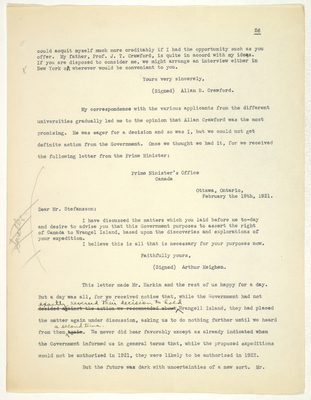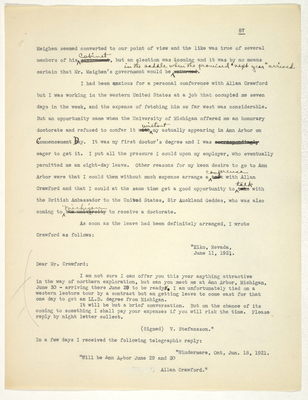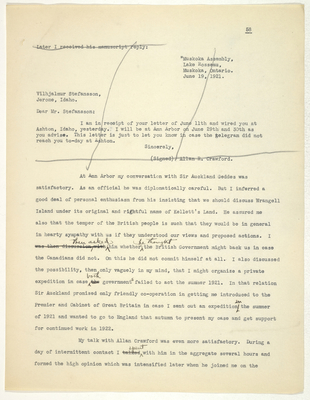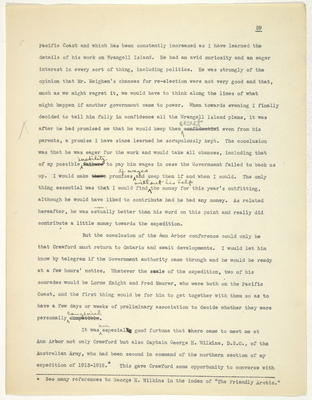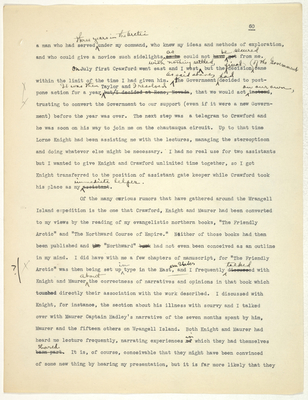Pages
stefansson-wrangel-09-27-011
56
could acquit myself much more creditably if I had the opportunity such as you offer. My father. Prof. J. T. Crawford, is quite in accord with my ideas. If you are disposed to consider me, we might arrange an interview either in New York or wherever would be convenient to you.
Yours very sincerely,
(Signed) Allan R. Crawford.
My correspondence with the various applicants from the different universities gradually led me to the opinion that Allan Crawford was the most promising. He was eager for a decision and so was I, but we could not get definite action from the Government. Once we thought we had it, for we received the following letter from the Prime Minister:
Prime Minister's Office
February the 19th, 1921.
Dear Mr. Stefansson:
I have discussed the matters which you laid before me to-day and desire to advise you that this Government purposes to assert the right of Canada to Wrangel Island, based upon the discoveries and explorations of your expedition.
I believe this is all that is necessary for your purposes now.
Faithfully yours,
(Signed) Arthur Meighen.
This letter made Mr. Harkin and the rest of us happy for a day. But a day was all, for we received notice that, while the Government had not exactly reversed their decision to hold Wrangell Island, they had placed the matter again under discussion, asking us to do nothing further until we heard from them a second time. We never did hear favorably except as already indicated when the Government informed us in general terms that, while the proposed expeditions would not be authorized in 1921, they were likely to be authorized in 1922.
But the future was dark with uncertainties of a new sort. Mr.
stefansson-wrangel-09-27-012
57
Meighen seemed converted to our point of view and the like was true of several members of his government cabinet, but an election was looming and it was by no means certain that Mr. Meighen’s government would be in the saddle when the promised "next year" arrived.returned.
I had been anxious for a personal conference with Allan Crawford but I was working in the western United States at a job that occupied me seven days in the week, and the expense of fetching him so far west was considerable. But an opportunity came when the University of Michigan offered me an honorary doctorate and refused to confer it with without my actually appearing in Ann Arbor on Commencement Day. It was my first doctor's degree and I was correspondingly eager to get it. I put all the pressure I could upon my employer, who eventually permitted me an eight-day leave. Other reasons for my keen desire to go to Ann Arbor were that I could then without much expense arrange a talk conference with Allan Crawford and that I could at the same time get a good opportunity to take talk with the British Ambassador to the United States, Sir Auckland Geddes, who was also coming to the university Michigan to receive a doctorate.
As soon as the leave had been definitely arranged, I wrote Crawford as follows:
"Elko, Nevada, June 11, 1921.
Dear Mr. Crawford:
I am not sure I can offer you this year anything attractive in the way of northern exploration, but can you meet me at Ann Arbor, Michigan, June 30 - arriving there June 29 to be ready?. I am unfortunately tied on a western lecture tour by a contract but am getting leave to come east for that one day to get an LL.D. degree from Michigan.
It will be but a brief conversation. But on the chance of its coming to something I shall pay your expenses if you will risk the time. Please reply by night letter collect.
(Signed) V. Stefansson."
In a few days I received the following telegraphic reply:
"Windermere, Ont, Jun. 18, 1921.
"Will be Ann Arbor June 29 and 30
Allan Crawford."
stefansson-wrangel-09-27-013
58
Later I received his manuscript reply:
"Muskoka Assembly, Lake Rosseau, Muskoka, Ontario. June 19,/1921.
Vilhjalmur Stefansson, Jerome, Idaho. Dear Mr. Stefansson:
I am in receipt of your letter of June 11th and wired you at Ashton, Idaho, yesterday. I will be at Ann Arbor on June 29th and 30th as you advise. This letter is just to let you know in case the telegram did not reach you to-day at Ashton.
Sincerely, (Signed) Allan R. Crawford
At Ann Arbor my conversation with Sir Auckland Geddes was satisfactory. As an official he was diplomatically careful. But I inferred a good deal of personal enthusiasm from his insisting that we should discuss Wrangell Island under its original and rightful name of Kellett’s Land. He assured me also that the temper of the British people is such that they would be in general in hearty sympathy with us if they understood our views and proposed actions. I was then discussion with then asked him whether he thought the British Government might back us in case the Canadians did not. On this he did not commit himself at all. I also discussed the possibility, then only vaguely in my mind, that I might organize a private expedition in case the both governments failed to act the summer 1921. In that relation Sir Auckland promised only friendly co-operation in getting me introduced to the Premier and Cabinet of Great Britain in case I sent out an expedition in the summer of 1921 and wanted to go to England that autumn to present my case and get support for continued work in 1922.
My talk with Allan Crawford was even more satisfactory. During a day of intermittent contact I talked spent with him in the aggregate several hours and formed the high opinion which was intensified later when he joined me on the
stefansson-wrangel-09-27-014
59
Pacific Coast and which has been constantly increased as I have learned the details of his work on Wrangell Island. He had an avid curiosity and an eager interest in every sort of thing, including politics. He was strongly of the opinion that Mr. Meighen's chances for re-election were not very good and that, much as we might regret it, we would have to think along the lines of what might happen if another government came to power. When towards evening I finally decided to tell him fully in confidence all the Wrangell Island plans, it was after he had promised me that he would keep them confidential secret even from his parents, a promise I have since learned he scrupulously kept. The conclusion was that he was eager for the work and would take all chances, including that of my possible failure inability to pay him wages in case the Government failed to back us up. I would make these promises of wages and keep them if and when I could. The only thing essential was that I would find without his help the money for this year's outfitting. although he would have liked to contribute had he had any money. As related hereafter, he was actually better than his word on this point and really did contribute a little money towards the expedition.
But the conclusion of the Ann Arbor conference could only be that Crawford must return to Ontario and await developments. I would let him know by telegram if the Government authority came through and he would be ready at a few hours' notice. Whatever the scale of the expedition, two of his comrades would be Lome Knight and Fred Maurer, who were both on the Pacific Coast, and the first thing would be for him to get together with them so as to have a few days or weeks of preliminary association to decide whether they were personally compatible congenial.
It was an esspecially good fortune that there came to meet me at Ann Arbor not only Crawford but also Captain George H. Wilkins, D.S.O., of the Australian Army, who had been second in command of the northern section of my expedition of 1913-1918.* This gave Crawford some opportunity to converse with
*See many references to George H. Wilkins in the index of "The Friendly Arctic."
stefansson-wrangel-09-27-015
60
a man who had served three years in the Arctic under my command, who knew my ideas and methods of exploration, and who could give a novice such sidelights as he as could not have be secured get from me.
On July first Crawford went east and I west with nothing settled, but the final decision of the Government came within the limit of the time I had given him. As said above, The Government had decided to postpone action for a year. It was then Taylor and I resolved, but I decided at Reno, Nevadathat we would act on our own, trusting to convert the Government to our support (even if it were a new Government) before the year was over. The next step was a telegram to Crawford and he was soon on his way to join me on the chautauqua circuit. Up to that time Lome Knight had been assisting me with the lectures, managing the stereopticon and doing whatever else might be necessary. I had no real use for two assistants but I wanted to give Knight and Crawford unlimited time together, so I got Knight transferred to the position of assistant gate keeper while Crawford took his place as my assistant immediate helper.
Of the many curious rumors that have gathered around the Wrangell Island expedition is the one that Crawford, Knight and Maurer had been converted to my views by the reading of my evangelistic northern books, "The Friendly Arctic" and "The Northward Course of Empire." Neither of those books had then been published and the "Northward" book had not even been conceived as an outline in my mind. I did have with me a few chapters of manuscript, for "The Friendly Arctic was then being set up in type in the Eastern States, and I frequently discussed talked with Knight and Maurer about the correctness of narratives and opinions in that book which touched directly their association with the work described. I discussed with Knight, for instance, the section about his illness with scurvy and I talked over with Maurer Captain Hadley's narrative of the seven months spent by him, Maurer and the fifteen others on Wrangell Island. Both Knight and Maurer had heard me lecture frequently, narrating experience of in which they had themselves been part. shared. It is, of course, conceivable that they might have been convinced that they might have been convinced of some new thing by hearing my presentation, but it is far more likely that they
